Stéphane Lambiel: "If I wanted to compete I would compete"
 April 2, 2012
By Reut Golinsky
Photo © Reut Golinsky
A birthday is a natural point in the timeline of your life to pause, look back and reflect on what has been. Towards his 27th birthday Stéphane Lambiel and I took a little stroll down memory lane watching some old videos and reading some old interviews. We recalled his first appearance on the world stage fifteen years ago, busted up stereotypes of the King of Spins and the Little Prince, and discussed why it's so important to keep being a child.
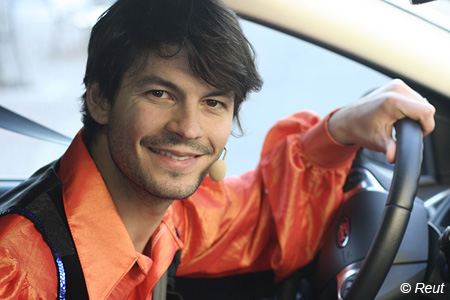
Looking back and recalling the past is not very typical for you...
(smiles) No, it's not typical. Actually I have collected a big archive throughout my career - stuff that my Mom recorded, that fans gave me, DVDs from friends - but I never watch it. I don't know if it's because I don't have enough time or because I just don't feel the need. I feel that the moment right now is more important and I prefer to enjoy it rather than recalling something that's already happened. I feel it's a waste of time to look back if I have something happening right now. I want to use this moment and not the moments from the past.
But it's not a waste of time for people like me who started to follow your career rather late and wanted to know how everything started. I'm really grateful that there are some archives...
It's true. And probably in ten years, I will be grateful to have this archive; to open it and watch some good stuff. Maybe later when I have some time to catch my breath I will look back. But right now plenty of things happen in my life and I need to take those opportunities. I'm twenty seven but I feel like I'm ten, I need to understand, I need to experiment, I need to make my way... Hopefully in ten years when I look back I will have no regrets; I haven't had any so far. I feel someone has lit up everything that's happened and come into my life. I was not wandering in the dark. I could always see where I was going; I just had to take a step.
Why ten years?
Ten years. Or twenty. Or maybe when I am sixty, I don't know. I say "ten years" just to say a number, but "ten years" means "someday".
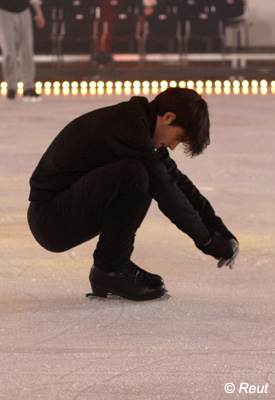 But don't you feel nostalgic sometimes? When you received your Crystal Ice Award in Luzhniki a few years ago, you said: "I remember being here getting my first World title".
But don't you feel nostalgic sometimes? When you received your Crystal Ice Award in Luzhniki a few years ago, you said: "I remember being here getting my first World title".
Yes, but not nostalgic. I remember the feeling, there's this kind of déjà vu when you enter a place and know the sense, the smell, and you say: "Ah, this smell reminds me of something". And I enjoy it, I'm happy to be back. But I'm not thinking: "I'm here, I wish I could go back five years to when I was here last". That's a different feeling, more like: "Wow, this smell makes me happy because I have great memories from here".
Do you remember your first competition? Your first standing ovation?
I remember the standing ovation in Calgary after my free program (at Worlds 2006 where he won his second world title - ed), that was probably the most incredible standing ovation in my life. I was the last to skate... I didn't know that Brian (Joubert) had skated well, but I knew I couldn't make any mistakes, because one mistake would be a disaster...
And I do remember my first costume. It was turquoise. The first costume has a strong meaning for me and maybe for other skaters too. When you go on stage you need to get into character, and the first thing to help you develop that character is your costume.
You have reused some of your programs for shows, like "King Arthur", "Magic Stradivarius" and "Four seasons". How was it to return to those programs after a few years?
It was a great feeling. Even, for example, this program - I would love to try it right now. (Stéphane points to the video of his exhibition program to "Hernando's Hideaway". He skated it at the Worlds gala in 1997 in Lausanne, and we continue our talk while watching it). I would like to skate it again and see the difference. It would be so interesting and funny! I would probably be more conscious today about musicality, about where to put the accents...
It was pretty impressive for a little boy at Worlds. You seemed so confident, but weren't you afraid?
I was nervous, but I was always nervous. I think I loved it, I loved to have the attention on me and I was using that attention to perform.
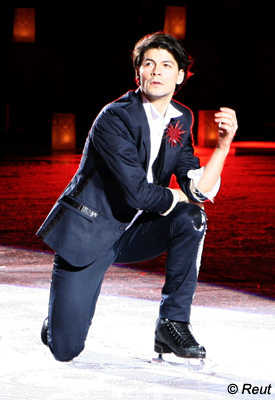 It's funny to think that people had no idea who they were watching, who this boy would become.
It's funny to think that people had no idea who they were watching, who this boy would become.
But I knew at that moment, I knew where I wanted to go. Maybe I was the only one who knew then...
You were a wonder child, winner and champion since a very young age. Did you feel any jealousy towards you?
I never noticed. Maybe there was but I didn't see it... I don't see it...
You were the Swiss novice champion at the time. Is that why they invited you to perform?
Peter (Gruetter) asked one of the organizers. In championships there is always a (local) newcomer who skates in the gala, and he knew that they were looking for someone for the exhibition, so he asked. That person said "OK, he can skate", but until the day of the gala we still didn't know if I would skate or not, it was last minute decision.
Did Salomé Brunner choreograph your programs already back then?
Yes, it was our first program together. As soon as you start competing you need to have a choreographer and from the beginning I had someone to choreograph my programs. But this was the first one we did with Salomé; she was working with Peter and he asked her to help his students. We met one summer when I was training in Oberstdorf. I don't remember exactly where we choreographed this program, but I know that it started because of Peter.
Spanish themes appeared pretty early in your career, and have followed you all along.
As a child I was always inspired by Spanish music. I probably felt comfortable with it; it was me, my music. Today I am more open to new styles, but before I had this vision of something Spanish... I had a few tangos; even before 1997 I had Astor Piazzolla's tango. It's true I have had many Spanish programs and I still love Spanish vibes. Do I have any ideas for Spanish programs for the next years?
Yes, you mentioned the tango in a recent interview.
Really? Oh, yes, I already forgot. (laughs) It's because the priority was on my project on stage and on numbers for "Art on Ice", so I was working on those ideas and put all others aside for a while. There is a tango that I really would like to do, something different from everything else...
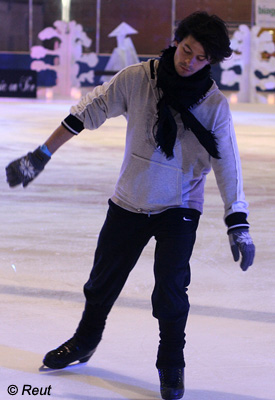 (Still watching the performance)
(Still watching the performance)
Your spins in 1997 are already pretty good, aren't they?
They are OK, I mean the camel spin is not as good as later, as now, but they are OK.
Since when did spins become important to you? People call you "The King of spins"...
Spins were important from the beginning... You know, sometimes I'm a little bit disappointed that people only talk about my spins. OK, maybe these are good spins but I never focused on spins, I never wanted anyone to emphasize my spins; I worked on everything! Maybe it's the element which is the easiest to notice: "Oh, spins are impressive". But I think it's not only spins. I hope not! It's probably the part that I worked on the least! It's very frustrating... I mean, I'm happy when someone says: "I love your spins", that's not a problem. It's just that I don't like it when they only remember the spins. Sometimes it feels like I can only do spins.
You know maybe you should make a program...
...without spins! (laughs)
A really interesting program but without spins, I'm sure you can do it. And this way you will prove to everyone that...
...it's not only about spins. Thank you for the advice, I will take it, definitely!
You had your specific "set" of spins, but in the last few years some disappeared.
Like which ones?
For example the "A"-spin. Actually I don't miss it; it's not really aesthetic...
Exactly! That's why I'm not doing it. Maybe I was not aware of it, but at some point I realized how ugly it was.
And in your recent programs you added some new variations to existing spins. Is this something you're planning to develop?
Of course! For competitions I was always doing the same spins because of the rules. And some things were more convenient, for example, to have a combo at the end. But in the exhibition number I don't have any rules so I perform the spins I want. And if I don't want to do spins, I don't do them.

You came into skating following in your sister's footsteps. Do you remember the last time you skated with her?
It was during one of those interviews after Worlds 2005. Yes, I think it was the last time we were on the ice together. But that was a one-time experience. Silvia quit skating in 1996, when I was eleven. The first two weeks after that I was completely depressed because she was the reason I started skating. I was really, really sad, it felt so weird going to the rink without her. It's like you had a good habit and suddenly it's gone. I tried to convince her to continue but without any success.
I can understand her, for an older sibling watching a younger one who is already better might be depressing...
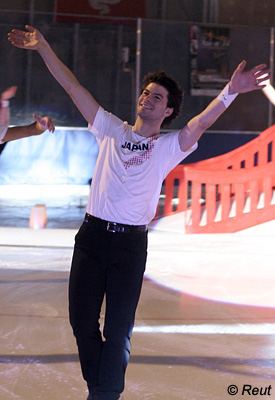 Yes, it's true. It probably influenced her to stop, but she also had some other problems like too much school work. But seeing that she worked more than me and having less result... And especially because she knew that she was not meant to be a figure skater. She understood that when she was 14 so it was good that she didn't waste more time on the ice knowing that it was not for her. And perhaps the fact that I was improving quicker proved to her that it was not for her.
Yes, it's true. It probably influenced her to stop, but she also had some other problems like too much school work. But seeing that she worked more than me and having less result... And especially because she knew that she was not meant to be a figure skater. She understood that when she was 14 so it was good that she didn't waste more time on the ice knowing that it was not for her. And perhaps the fact that I was improving quicker proved to her that it was not for her.
Didn't you ever want to go skating together, just for fun?
I really wanted to, but years after she put the skates away. She never wanted to go back on the ice so I never pushed her. Now she does a lot of sports, she loves the mountains: climbing and skiing; she does more sports than I do! Sometimes I ask her: "Can you come to the rink and skate with me?" One time I succeeded and took her to a shop to buy new skates, she went on the ice once and that was it...
At the beginning of your career, when you were still unknown, you already had an Official Fan Club, tell me more about it.
When I was 14, it was in 1999, my parents got divorced. As you know, in Switzerland we don't have any support for sportsmen; so my Mom had to start working to earn money to pay for my skating lessons. It was a rather hard time. The figure skating season requires a lot of money, around 100 000 Swiss francs, and my mother couldn't pay that. Then some people from the village (Saxon) got together - that was my uncle's idea - and decided: let's help this young athlete who has some talent. It started as a small group, friends and neighbors, and every year it got bigger and bigger.
It doesn't exist anymore. We had our last reunion last autumn and we closed it. The idea of this club was to follow my competitions, but what you need to understand is that they were not skating fans, they were people from the village who were supporting me to be able to skate; they were supporting my career. For them it was great to go to competitions and to see my progress; how I improved, my results. That doesn't mean that those people won't follow what I do now, but this part of their support has no purpose anymore.
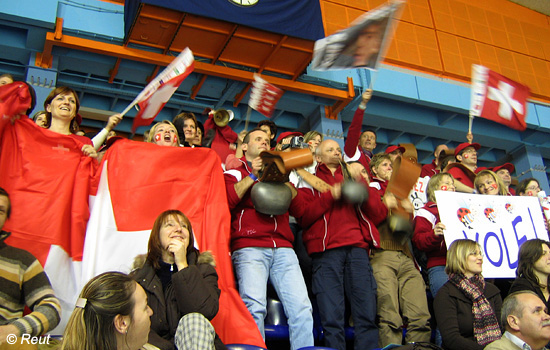
Official Fan Club cheers for Stéphane at Euros 2008
Since 2001 you have skated in seniors although you could have stayed a few more years in juniors. Whose decision was it, yours or your federation's?
I went senior because I was ready. For me it felt, like I said before, that a light was there at the right moment and I only had to step forward. I was very ambitious and felt that my federation was holding me back. I remember how they didn't let me go to Worlds 2001 even though I was the Swiss champion and I was ninth at Europeans, something that Patrick Meier had never achieved. And even before that, for junior Worlds 1999; I did the Junior Grand Prix quite well for the first year (8th at both events - ed), but another skater, Oscar Peter, was sent instead because it was his last year in juniors. So not just once did the federation decide to decline my participation in big events, just because others had more experience blah blah...
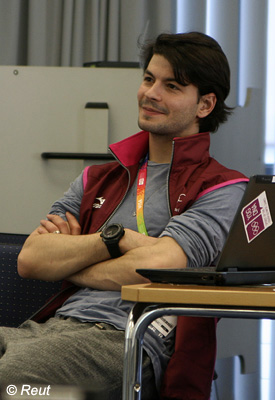 Don't you think your body wore out pretty early because you competed at such high level while so young?
Don't you think your body wore out pretty early because you competed at such high level while so young?
I think it's like in gymnastics and in all those sports where you have to be very tonic; you have the peak of your tonic energy around 20-21 years old. For sports which require more endurance you have this peak later. That's why after 20-21 it's really hard to stay fresh, tonic and dynamic, although you may be stronger in other fields at that age.
So you think it was the right decision to have a few years in seniors before that peak?
I don't know if it was right or wrong, but it was good like that. I'm happy with how it was. Why should I have stayed at home? There is judgment in your questions! (smiles)
Not judgment, I'm just thinking that had you waited back then you could still skate now...
But I'm still skating!
...compete, sorry.
But it's not a physical problem that makes me... I'm still skating! I'm healthy today and if I wanted to compete I would compete. But I don't want to compete! The reason is not physical. It was physical back when I had to stop (in 2008), a serious problem with my hip when for a year I couldn't find a solution. I solved it and came back because it was solved. But after Vancouver... The decision I took when I was 12 was "until Vancouver", it was until 2010 with or without a medal. When I've stopped after Vancouver it was because I was done with competitions.
You retired from competitions, but you are a great inspiration for younger skaters, they look up to you. How does it feel?
I think it's great to inspire young athletes. I was inspired by Alexei Yagudin and Ilia Kulik, and I'm still inspired by all the skating champions. Even by the young athletes at Youth Olympics, when I watched Han Yan (2012 World Junior Champion, 2012 Youth Olympics champion - ed) I was inspired. Age doesn't matter, and it doesn't matter if you're a champion or not, you can still learn from others. Of course young skaters need to be inspired by someone, they need to learn, to watch videos. When I was young I would watch hundreds and hundreds of videos at home, again and again. I knew all the results by heart, I knew who was skating to what music; everything was about skating.
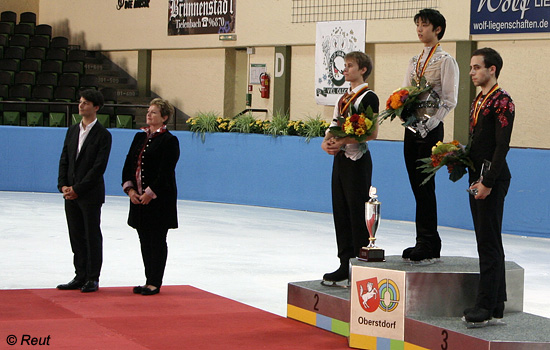
Medals ceremony at Nebelhorn Trophy 2011
When the new judging system was introduced you were asked about it and answered: "I find it really great, I especially like the fact that it's now possible to know what other skaters did in competitions!" So back then you were excited about it.
I'm still excited, but I think there are many things that can be improved. I agree with what I said, it's great that you can see the protocols and all the elements skaters have done; you can get an impression of if it was good or bad. But I still think that the judges need to be more consistent with the components, right now they try to follow the "corridor" (in grades) and they are afraid to go beyond it. That's possibly something that has to change. The other thing is the freedom in the spins and the footwork, because right now the rules are so strict that if you want to get the high levels you need to do exactly the same as the other skaters. When you watch ice dance they will have almost the same beginning of the footwork, because they have to do those deep edges with difficult turns; the twizzles. On the other hand I think it's interesting because the fantastic champions still, even with all those rules, find new things and bring more than just the elements. That's why I love Tessa and Scott (Virtue/Moir), because when you watch them you don't see the rules, you see the story, the emotion.
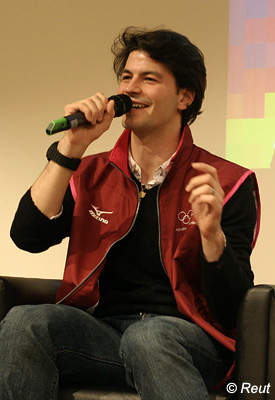 I'm not sure about the ranking in the World Standings, for me it doesn't make sense to compare competitions. There are different judges and the scores are different; at one competition they might award higher points, and sometimes you get levels you didn't get in the previous competition. It's really hard to compare one competition to another! In the Grand Prix they use the standings to define who will be in the Final. It's difficult to understand why they can compare the results of one person doing one Grand Prix event, to another person doing a different Grand Prix event.
I'm not sure about the ranking in the World Standings, for me it doesn't make sense to compare competitions. There are different judges and the scores are different; at one competition they might award higher points, and sometimes you get levels you didn't get in the previous competition. It's really hard to compare one competition to another! In the Grand Prix they use the standings to define who will be in the Final. It's difficult to understand why they can compare the results of one person doing one Grand Prix event, to another person doing a different Grand Prix event.
But you need to compare something somehow... It's also good for the athlete to see his improvement during the season; many get higher season's best with each competition.
Yeah, but sometimes they miss all the jumps and still get season's best!
I think I know who you're talking about...
Well, I'm talking about many people who skate badly and still get season's best. So I don't think you can compare one competition to another, really, it's impossible!
Years ago you got your nickname "Little Prince". At age 27 and retired the press still calls you that. Aren't you tired of it?
It doesn't bother me.
But I mean, come on, when you're forty will they still call you Little Prince?
You know what? I know who I am and what I'm doing; I know what my life is. The people around me - my family, my friends - don't call me Little Prince so I don't have this problem. And if the press wants to call me Little Prince it's their decision. You can't influence the press, they write what they want.
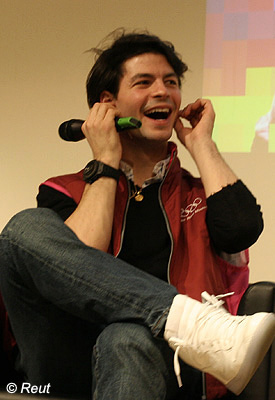 Well, at least you can say: "I don't like it" or "Stop calling me that" or "I'm not little, not a child any more".
Well, at least you can say: "I don't like it" or "Stop calling me that" or "I'm not little, not a child any more".
I don't know... I think I'm still a child and I hope I will have a young mind forever. Maybe that's why it doesn't bother me?
In some old interview you said that you hope to keep the child in you. Do you think you've managed to do that?
So far I have managed... Well, I didn't manage it, because if you manage something it means it didn't come naturally. If you say you manage to be innocent, it means you're not innocent anymore.
Everything I do, I do without thinking "Is it good to do this?" I just do it. I have this curiosity to see what will happen, and explore who I am. I don't calculate what I will do, so even if it's a mistake I can still enjoy it and see why I'm doing it. When I accepted to be an Athlete Role Model (at the Youth Olympics) I didn't expect anything, I just came and discovered it. I used every day as an opportunity to share the moment with people I'd never met, and it was great.
Being a child means not being responsible...
No, I don't agree with that. I was a child but I've been responsible since a very young age.
Since you started to earn your own money?
Whether the money comes from your parents or from your own work, you're responsible for what you're doing. My father used to pay for my skating and my rent, because I still was not earning any money, but I was as responsible for my things as I am right now.
Being a child also means being dependent on grown-ups. Is being a child always good?
Yes. Yes! Because as a child you learn and as an adult you don't learn, you teach.
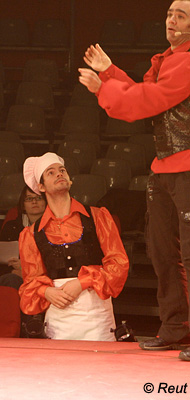
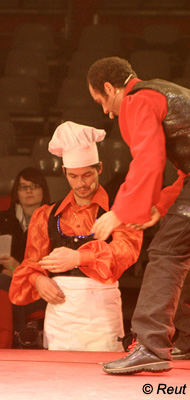
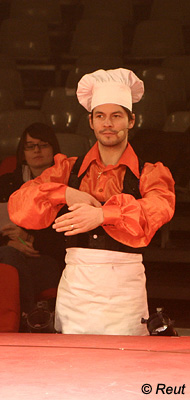
Rehearsals of "La Revue"
Another year of Stéphane's life, the second season in his pro career, has ended. During this year he showed the audience six new exhibition programs; choreographed for a few skaters including Carolina Kostner and Tatsuki Machida; worked with Mishin's students in a summer camp; acted as an Athlete Role Model in the 1st Winter Youth Olympic Games; performed on stage in the comical show "La Revue" and even had a small cameo as a singer at the opening number of "Art on Ice". What's next? We doubt he himself knows yet. So we just want to wish him health and positive energy, which should help him in any new challenge he decides to take on.



